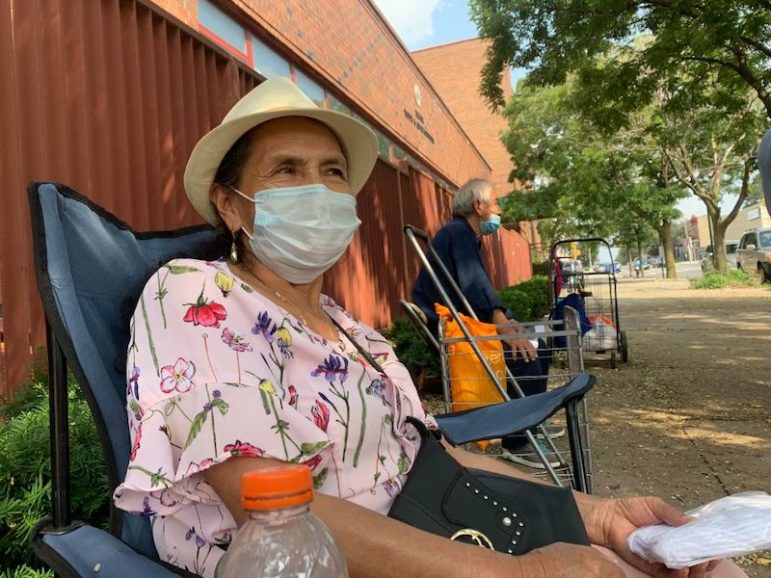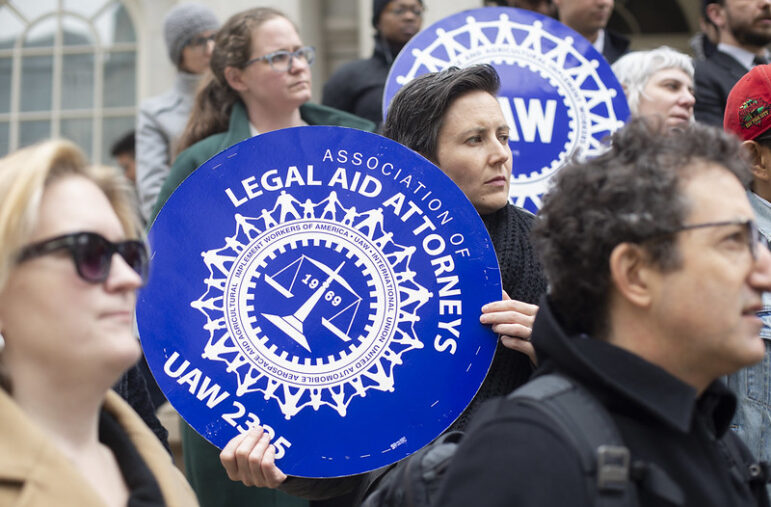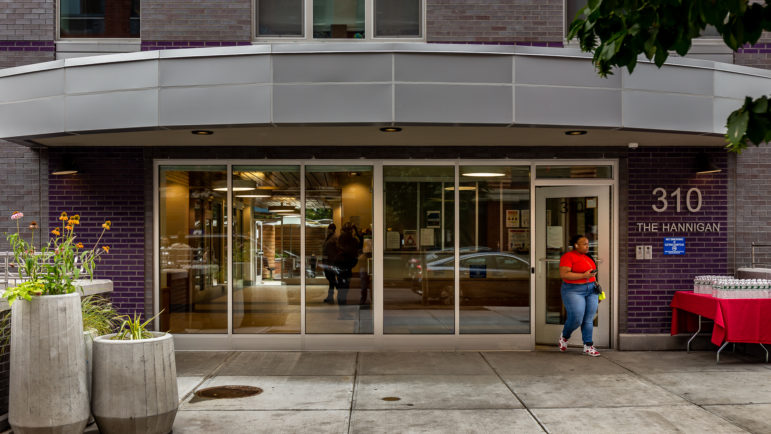In order to survive, people who do not qualify for any direct federal, state or municipal financial aid have turned to queuing twice a week at pantries across the five boroughs.

Edwin Martínez
María Quispe at a Queens pantry. Many Latinos say that they are going hungry even as the city works to keep food available.Read the original story at El Diario.
The COVID-19 pandemic exploded in the New York City over four months ago and, so far, it has claimed 18,979 lives and infected 225,713 people.
Still, on top of the fear of catching the disease, ending up in the hospital or even dying, what terrifies people like Rosa Falcón, the mother of three children of four, seven and 11 years of age, is hunger. An estimated 2 million New Yorkers are struggling to afford their groceries.
Falcón, who is an immigrant, said that she is ashamed to request assistance because she never expected to have to ask for “handouts.” She is one of millions of Latinos nationwide who have lost their jobs and do not qualify for any direct federal, state or municipal financial aid. In order to survive, they have turned to queuing twice a week at pantries across the five boroughs.
“I have to thank God because at least we get something and we don’t starve, but – I do not want to sound ungrateful – the truth is that sometimes the line forms as early as 5:00 in the morning and you end up going home with canned food high in sodium, and no milk or meat or anything healthy,” said the head of household as she stood in a queue at her local pantry in Corona, Queens. Falcón added that she has not received one dollar in income since March, when she lost her job as a restaurant cook.
“I would be lying if I said that I am starving, but I cannot really say that my children and I are going to bed with our bellies full and well nourished,” she said.
For María Quispe, who is over 70, the lack of work has also hit her family hard. So much so that they, too, have had to turn to the pantries in order to eat.
“At least with this, one can make sure to have a bit of lunch. We had never been in such a difficult situation, and we are indeed hungry,” said the Ecuadoran-born grandmother. “We have to be grateful, but there is always the need to invest more and give people better things so they do not go hungry, especially the little ones,” added Quispe, a resident of Corona, where she visits the local pantry.
Testimonies like these support the claims made by non-profit Hunger Free NYC, which says that hunger in the city is off the charts. Their data reveals that, during the peak of the pandemic in April, 38 percent of parents reported to have skipped meals or reduced portions in order to feed their children because they could not afford to buy food.
The organization announced the opening of a new assistance center in The Bronx (at 938 Sheridan Avenue), an area disproportionately hit by COVID-19. They also raised the alarm that the borough, where unemployment reached 25 percent in June, is going hungry.
“Even before the pandemic, The Bronx was the hungriest borough in New York City, with almost one in every four residents facing food insecurity between 2016 and 2018,” said the organization.
Feeding America, another non-profit, said that, since the pandemic began, demand for food has grown 70 percent. The Food Bank for New York City also reported a 53 percent spike among the over 1,000 pantries across the city.
“Since the outbreak began, Food Bank for New York City and our network of soup kitchens and food pantries have distributed more than 30 million meals to New Yorkers in need, but charity alone cannot defeat poverty and food insecurity,” said Leslie Gordon, president and CEO of the organization. She urged the Trump Administration to take immediate action.
“The federal government must take a step forward to tackle the magnitude of these national challenges by approving a bill to strengthen the entire social safety net, increase SNAP benefits and eliminate the rules taking assistance away from low-income families, and extend the Pandemic-EBT program, which helps families with children in public schools,” she added.
Marlon Pico, who knows what it’s like to go hungry and queue for hours to collect food, agreed that more aid is needed. The 68-year-old immigrant, who picks up groceries at a Bedford-Stuyvesant pantry, said that it is painful to see with his own eyes how people in New York are going hungry.
“[The local and state governments] feed us. There are many places outside where you can go and get something. I always come to the pantry near my house, and there are many of them around here. They also give free lunches to go, and that aid is really helpful, but they need to improve it because there is not enough money,” said the Ecuador native. “I know of many people who are starving – of course it is happening, it is definitely happening in New York. But I also think that many people do not know about the pantries, and it would be good for the city to have a campaign on TV and the media talking about these places.”
María Santacruz, a mother of three who also visits the pantries in Corona, called for the food banks to distribute healthier foods.
“I come here twice a week now. Last week, they gave out cereals and canned food. Nothing else. That was all. That is not healthy. There are many people like me who are unemployed and have no money, and this bit of help allows you to at least eat a snack, but they need to improve it so that people are better nourished,” she said, adding in an ironic tone that sometimes she “gets lucky” and comes out of the pantry with “a slice of beef,” which is not enough for the five people in her household.
Sources in the de Blasio Administration said that they have not heard about these concerns, adding that they are fulfilling the mayor’s promise he made on April 15 when he announced the Feeding New York program, which received $170 million in funding. On that occasion, de Blasio guaranteed that “no one will go hungry” in the Big Apple during the pandemic.
“The City of New York is keeping its commitment to make sure that none of our neighbors goes hungry because of this crisis. Along with the City Council, we have provided $25 million in emergency funding for the pantries, and the city’s personnel has gone to work directly with the pantries to help with their staffing challenges,” said Joshua Goodman, spokesman for the so-called “food czar of New York,” Sanitation Commissioner Kathryn García. “We are also distributing around 1.5 million meals every day to people in need across the city. Anyone who needs food may visit nyc.gov/getfood or dial 311.″
Translated by Carlos Rodriguez









